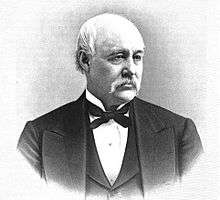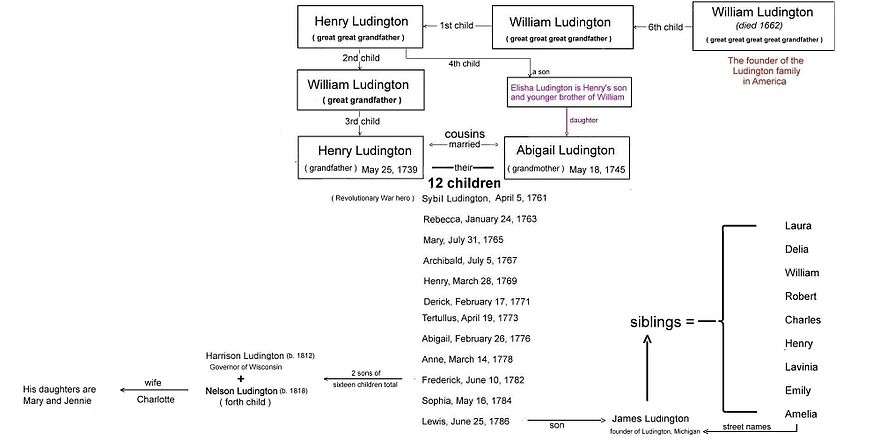Nelson Ludington
Nelson Ludington (January 18, 1818 – January 15, 1883) was a nineteenth-century American businessman, lumber baron and banker. Born in Ludingtonville, New York, he made his fortune in the Midwest based on resource exploitation: lumber, iron ore and copper.

He bought large tracts of timber land on the Upper Peninsula of Michigan, where he was associated with the founding of the city of Escanaba. He also had a branch and the main lumber yards in Milwaukee, Wisconsin, but eventually based his namesake company in Chicago, Illinois, which became the boom town of the upper Midwest. There he helped found and served as president of the Fifth National Bank of Chicago.
Ancestry

Ludington's four times great-grandparents William Ludington and his wife Ellen were his immigrant ancestors, progenitors of the American branch of the Ludington family line.[1][2] William (b. 1608) and his wife Ellen (b. 1617) emigrated from England to the Massachusetts Bay Colony in 1640, right after they married. They settled in Charlestown, Massachusetts.[1][3] They had seven children. About 1660 they moved to New Haven, Connecticut.[4]
Later generations lived in this area but, after the American Revolutionary War, they began to move into New York state. Ludington's grandfather Henry Ludington moved from Branford, Connecticut, to Putnam County, New York. This frontier settlement was called Ludingtonville after him. It was later known as Kent, New York.[1][2][5]
Life
Ludington was born January 18, 1818, in Ludingtonville in Putnam County, New York.[1] His parents were Frederick Ludington and Susannah Griffeth.[5] Ludington was the fourth of their sixteen children.[6] The youth received private schooling by tutors for his early education.[7] Ludington took courses at the Tucker Hill Academy as the last part of his formal education.[1][7]
Ludington's training for the business world started at a general store at Cold Spring, New York, a town located along the Hudson River.[1][2] He later became a clerk in a dry goods store in New York City and received further training in retail business.[1][7] In 1839 he joined his older brother, Harrison Ludington,[8] in the firm Ludington, Burchard and Company, which was owned by his brother, uncle Lewis Ludington, and Harvey Burchard.[1][7] After two years Nelson Ludington purchased Burchard's share of the business, and changed the name of the firm to Ludington and Company.[7] Ludington was with the business until 1847, when he sold his ownership share to the other partners.[1]
Ludington started in the lumber industry with Daniel Wells Jr. and Jefferson Sinclair in 1848, in a new firm called Nelson Ludington & Company (sometimes shortened to N. Ludington & Co.). He recognized that the rapid expansion of western towns around the Great Lakes would increase market demand for lumber, so he bought up large tracts of timber lands in the Upper Peninsula of Michigan. Ludington constructed various mills to process the lumber and related resources.[7]
Escanaba, Michigan (originally called Flat Rock), was one of the places where Ludington established a sawmill.[9][10][11][12] Since he was a pioneer of the area and an early developer, he named the settlement.[13][14][15]
Locals suggested it be named after the nearby river, known as the "Escanawba" by the local Ojibwa Indians, referring to the smooth, flat rocks on the river bottom.[16] His hired surveyor, Eli Parsons Royce, entered the name on the town design schematic, as he understood it from a local Indian.[17] Royce spelled it as Escanawba. That was entered with the state in 1863 as the legal name for the town. Pioneers changed it a few years later to "Escanaba", simplifying the spelling. [18]
Ludington later constructed sawmills at Marinette, Wisconsin.[19] His mills manufactured lumber that was sold in Michigan, and as far away as Chicago and Milwaukee, Wisconsin.[19] For the first few years of Nelson Ludington & Company, the main docks and lumber yards of the firm were at Milwaukee. It was the main distribution point to places throughout the United States via shipping on the Great Lakes.[19] Ludington's older brother Harrison joined the company in 1851 and took charge of the operations in Milwaukee.[20]
Nelson Ludington started a branch of the company in Chicago and eventually made it his headquarters, as the city was booming and became the center of the Midwest. In 1854 the Milwaukee office closed. The business in Chicago greatly expanded and had some changes in partners. The firm continued until 1868, when it was renamed as "Nelson Ludington Company", with Ludington as its president. He held that position until his death in 1883,[21] serving as CEO of the company that bore his name for thirty-five years.[22]
In 1863, Ludington was involved in forming the Fifth National Bank of Chicago. He became its president in 1868, serving until 1872, when it became the National Bank of America. While living in the city, he became one of its directors. He accumulated a considerable fortune.[23]
Marriage and family
He married Charlotte J. and they had two daughters. Mary Ludington married Charles J. Barnes, of the publishing house of A. S. Barnes and Company. He became managing director of the American Book Company in Chicago. Jennie married George W. Young, a Chicago businessman.[6]
Ludington died January 15, 1883, in Chicago.[24][25][26] He left a large estate to his wife and daughters.[1]
Legacy
- The Ludington Building, the earliest-surviving steel-frame building in Chicago, was financed in part by his daughter Mary Ludington Barnes from her inheritance.[27][28]
- The House of Ludington hotel in the Escanaba Central Historic District still has some portions of the original building dating to the 1860s.[29]
References
- Conard 1893, p. 479.
- Hotchkiss 1894, p. 290.
- Johnson 1907, p. 19.
- Johnson 1907, pp. 9–18.
- DWB 1960, p. 233.
- Hall 1896, p. 515.
- Hotchkiss 1894, p. 291.
- Society of Wisconsin 1960, p. 233.
- Nursey 1890, p. 17.
- "Delta County First Cemetery for Whites". Escanaba Daily Press. Escanaba, Michigan. December 31, 1929. p. 14 – via newspapers.com

- "First Local Sawmill was built over a Century Ago". Escanaba Daily Press. Escanaba, Michigan. October 10, 1949. p. 6 – via newspapers.com

- "Early-Day Lumber Center Now Has Many Industries". Escanaba Daily Press. Escanaba, Michigan. March 31, 1956. p. 11 – via newspapers.com

- Dunathan 1963, p. 28.
- Dunathan, Clint (April 25, 1969). "Post Office Downtown Anchor May Be Slipping Far Westward". The Escanaba Daily Press. Escanaba, Michigan. p. 5 – via newspapers.com

- Dickson 2002, p. 55.
- "Royce Is Called City Founder; Helped Name It". Escanaba Daily Press. Escanaba, Michigan. June 29, 1963. p. 110 – via newspapers.com

Nelson Ludington gave Escanaba its name.
- Dunathan, Clint (June 29, 1963). "Royce Is Called City's Founder, Helped Name It". The Escanaba Daily Press. Escanaba, Michigan – via newspapers.com

- Dunathan 1963, p. 30.
- Hotchkiss 1894, p. 292.
- Conard 1893, p. 481.
- Krog 1971, p. 52.
- Conard 1893, pp. 479–481.
- Hotchkiss 1894, p. 295-296.
- Hotchkiss 1894, p. 117.
- "Anniversaries". Zanesville Signal-page 2. Zanesville, Ohio. November 20, 1946 – via newspapers.com open access.
- "Pith of The News". Standard. Albert Lea, Minnesota. January 25, 1883. p. 2 – via newspapers.com

- Conard 1893, p. 483.
- Hotchkiss 1894, p. 296.
- William E. Rutter (July 15, 2013), National Register of Historic Places Registration Form: Escanaba Central Historic District (PDF)
Sources
- Conard, Howard Louis (1893). National Magazine (Cleveland). Western History Publishing.
For thirty-five years he was the executive head of the firm, and later of the corporation which bore his name, and during that time a vast industry, and one which yielded splendid fortunes to nearly all those interested in it, was built up.
CS1 maint: ref=harv (link) - Dickson, Karl (2002). Stories of Small Town Sports. K. Dickson.
Nelson Ludington gave the name of the city of Escanaba, Michigan.
CS1 maint: ref=harv (link) - DWB, Society of Wisconsin (1960). Dictionary of Wisconsin Biography. Historical Society of Wisconsin.CS1 maint: ref=harv (link)
- Dunathan, Clint (1963). The Century book. Photo Offset Printing Co.
Nelson Ludington gave the name of the City of Escanaba.
CS1 maint: ref=harv (link) - Hall, Henry (1896). America's Successful Men. New York tribune.CS1 maint: ref=harv (link)
- Hotchkiss, George Woodward (1894). Industrial Chicago. Goodspeed Publishing Company.CS1 maint: ref=harv (link)
- Johnson, Willis Fletcher (1907). Colonel Henry Ludington. L.E. and C.H. Ludington (original from Harvard University).CS1 maint: ref=harv (link)
- Krog, Carl Edward (1971). Marinette: biography of a nineteenth century lumbering town. University of Wisconsin.
In 1867 Stephenson acquired three-eights interest in the Nelson Ludington Company. The following year ... In 1883, after the death of Nelson Ludington, Stephenson became president, acquiring a controlling interest in the firm.
CS1 maint: ref=harv (link) - Nursey, Walter R. (1890). City of Escanaba, Michigan. Lew A. Cates.CS1 maint: ref=harv (link)
- Society of Wisconsin (1960). Dictionary of Wisconsin biography. Society of Wisconsin.CS1 maint: ref=harv (link)
External links
| Wikimedia Commons has media related to Nelson Ludington. |